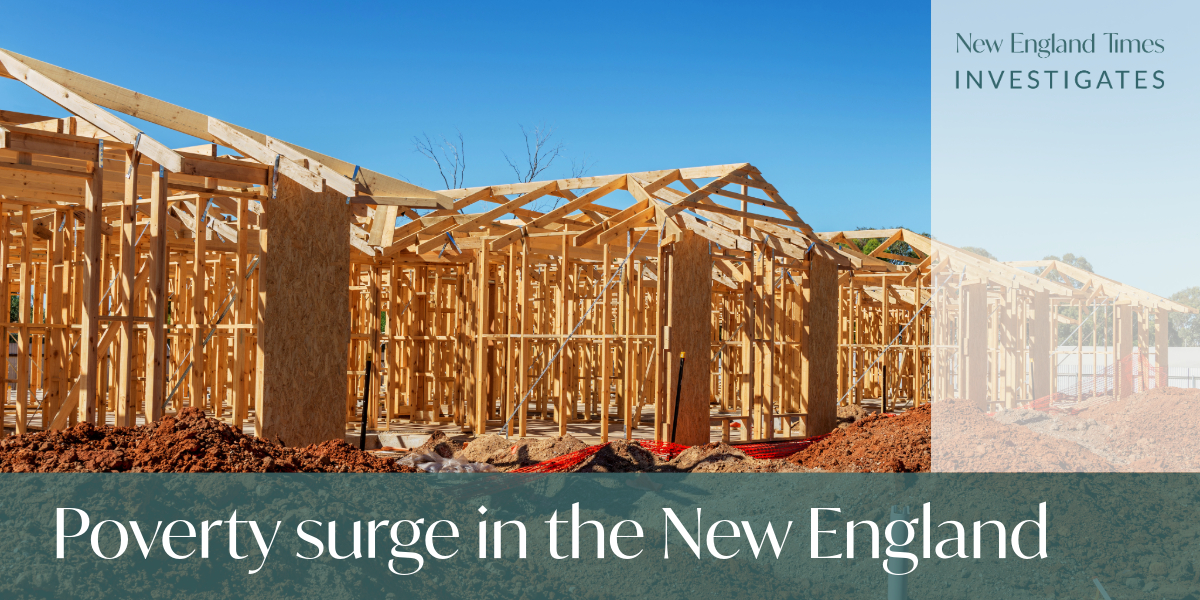In Part 1 of our investigation into the poverty surge in the New England we learned all signs indicate the New England region is facing an escalating crisis of poverty and economic disadvantage.
In Part 2, our experts clearly pointed to housing as a main driver of inequality, but noted this was compounded by complex causes of social disadvantage.
How do we flip the script and give people a chance? All alluded to the same idea: systematic upheaval, on a social, economic and political scale. But it’s not as complex as that sounds.
Drawing on their extensive experience, Sandy Avis of Centacare, Maree McKenzie of Homes North, Kate Van Doorn of Vinnies, and Major Tony DeTommaso of the Salvation Army join us again, this time to propose actionable solutions to address housing insecurity, employment gaps, and community support.

Housing needed to give foundation of stability
Sandy Avis, a financial counsellor with Centacare, identifies the severe lack of affordable housing as a primary barrier for low-income earners in the region. Many of her clients, particularly those in low-wage jobs, struggle to find rentals they can afford.
“If I had a magic wand, which is what I say to my clients, I would want more housing,” she said.
“More affordable rentals for your low-income people working a basic job, like at McDonald’s or KFC. You have to be able to afford to live, and right now there is no affordable accommodation.”
Avis suggests that increasing the housing supply, particularly for low-income earners, could provide immediate relief and greater stability. This would also allow individuals to focus on other priorities, such as employment and mental health.
Homes North CEO Maree McKenzie supports Avis’ stance, pointing to the need for diverse housing options in rural and regional areas. She highlights the passage of the Housing Australia Future Fund – A $10 billion investment fund to invest in social and affordable housing – as a promising start but more needs to be done.
“The Housing Australia Future Fund was a great start,” McKenzie said.
“But beyond that, we also need to build housing diversity and create more diversification in rural and regional areas.”
Homes North is actively working to address the shortage, proposing new developments in Tamworth, Moree, and Inverell to add to their already significant portfolio of 2700 properties. However, McKenzie stresses that housing solutions must be paired with other supportive services.
“Beyond housing, we need wraparound funding that can provide intensive support for these individuals.”
Building resilient communities
Clare Van Doorn, Regional Director of Vinnies, underscores the transformative power of secure housing in stabilising lives and enabling people to access employment and education.
“First on my wish list would be housing,” Van Doorn said.
“You give people secure housing, and they have a roof over their heads. They are more settled and can then seek employment and other opportunities.”
Van Doorn argues that community well-being is closely tied to housing stability. During the COVID-19 pandemic, increased Centrelink payments provided a glimpse of what could be achieved when people had adequate financial support.
“By creating stable housing, we then create better communities, better mental health, and more security for individuals and families,” she said.
Addressing systemic barriers
Major Tony DeTommaso of the Salvation Army highlights the importance of tackling poverty through a systemic approach. Poverty, he notes, is often the result of broader social and economic factors, such as inadequate job opportunities and lack of access to essential services.
“We need a systemic approach to tackle the underlying causes of inequality and injustice,” he said. “Dignity and respect for all individuals should be at the heart of poverty alleviation efforts.”
The Salvation Army offers a wide range of services, including emergency relief, transitional housing, and employment training programs. DeTommaso believes collaborative efforts are key to creating sustainable change.
“By working together, pooling resources, and sharing expertise, we can develop holistic solutions that have a lasting impact on poverty in the region,” he said.
Practical steps toward change
Through collaborative action, investment in housing, and systemic reform, each of our experts believe it is possible to build resilient communities where individuals have the stability and resources needed to thrive.
Several actionable solutions to address the challenges faced by the New England region were nominated by most or all of them:
- Increase Affordable Housing Supply: Expanding social and affordable housing through government funding, public-private partnerships, and community initiatives is crucial. Homes North’s ongoing projects in Tamworth and Moree are examples of how to tackle this issue locally.
- Enhance Transportation Infrastructure: Improved transportation links between rural and regional areas would help residents access medical, mental health, and employment services.
- Foster Local Economic Development: Creating sustainable job opportunities in regional areas is essential. This includes attracting businesses, supporting local industries, and investing in vocational training programs.
- Support Mental Health and Rehabilitation Services: McKenzie and DeTommaso stress the importance of accessible mental health and rehabilitation programs, especially for those experiencing homelessness or financial hardship.
- Promote Policy Reforms: Addressing systemic issues, such as housing affordability and income inequality, requires long-term policy changes. Reforms to negative gearing and investment in public housing could make a significant difference.
- Encourage Community Engagement: Volunteering and financial donations can directly support organisations like Vinnies and the Salvation Army, which provide critical services to those in need.
“Addressing poverty is not just a moral imperative; it’s an investment in the future prosperity and well-being of our communities,” DeTommaso said.
Our thanks to Steve Katte, Jo Dolan, and the Investigations Team for contributing to this investigation.
If you need help or are upset by this story, please seek support.
- 1800 RESPECT 1800 737 732
- Lifeline 13 11 14
- 13Yarn 13 92 76
- Beyond Blue on 1300 224 636
- Kids Helpline on 1800 551 800
- Headspace on 1800 650 890
Like what you’re reading? Support New England Times by making a small contribution today and help us keep delivering local news paywall-free. Donate now

